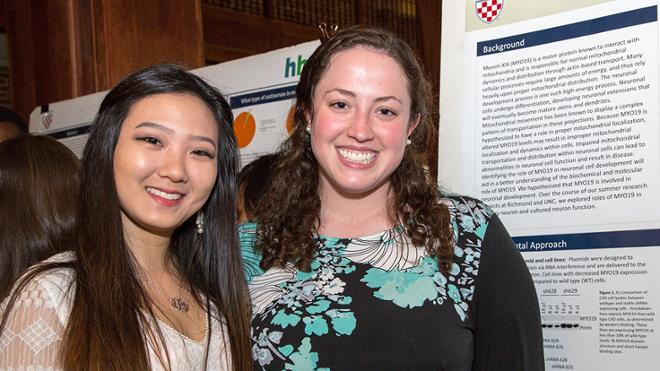Jenci Hawthorne, '17 and Amy Li, '17
Last summer, Jenci Hawthorne, ’17, and Amy Li, ’17, spent most their time in a dark room observing a multicolor light show with the aid of a black light. But they weren’t throwing a rave in their dorm room, they were conducing molecular biology research in assistant professor Omar Quintero’s biology lab.
Hawthorne and Li have been working with Myosin-19 (MYO-19), a motor protein involved in in the transportation of mitochondria to various parts of a cell. “We are examining MYO-19’s role in neurons to see how the growth and development of neurons is affected by the presence or near absence of the protein,” said Hawthorne. “Our research is important because defects in mitochondrial transport contribute to neurodegenerative diseases such as Parkinson’s disease.”
The best way to look at the protein and see how it affects the neurons is to view cells through fluorescent microscopy. “Each section of the cell, the DNA, the actin, the mitochondria, they’re each stained a different color, so it’s like a light show in the room,” said Hawthorne.
Quintero’s lab has been at the forefront of studying MYO-19, and he and his student researchers have seen some exciting results.
“With the neuron cells that we’re working with, we’ve noticed that lower levels of MYO-19 cause the neuron axons to grow more slowly,” said Li. “We’re thinking that MYO-19 is involved in the early development of neurons, and if we can find out more about that, we might be able to tie it to neurodegenerative diseases where the growth of neurons is important.”
While their research is promising, Hawthorne and Li will tell you that their results are less important to them than the experience they’ve gained in Quintero’s lab.
“After starting us off with a basic idea, Dr. Quintero encourages us to come up with our own protocol, allowing us to take ownership of a project and think about it holistically,” Li said. Hawthorne added, “I have room to make mistakes and figure out how to improve the project, and that makes a huge difference.”
“What I’ve enjoyed most about lab is learning how to troubleshoot certain problems,” Li said. “My first summer here, I was learning to fix and stain cells and I kept killing them so I could only see a couple under a microscope. I spent a good month trying to figure out what was wrong with my process, and with help from Dr. Quintero, I finally figured it out, which was a great feeling.”
Both agree that Quintero’s mentorship has been essential to their growth as scientists. “Dr. Quintero has taught us not only how to think scientifically and expand our critical thinking, but he also offers great life advice,” says Li. “He cares about us as individuals and makes sure he understands our goals so that he can help us reach them.”
As they make plans for medical school, Hawthorne and Li feel that their research experience will give them an advantage. “We know how research works in the real world; you have to be strategic, you have to be thoughtful,” Hawthorne said. “It’s the one place you can make an impact on the world as an undergraduate; I can’t go be a doctor yet, but I can make scientific discoveries, and that’s a cool feeling.”
